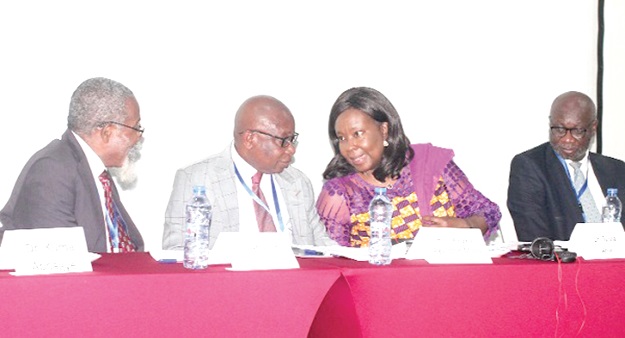
2022 Health Sector in review
This is the concluding part of the year in retrospect. The first part was published on Monday, January 16, 2023.
Advertisement
In 2022, the health sector saw a number of interventions and initiatives, both from the public and private sector, towards building a healthy population, one of the pillars of sustainable socio-economic development.
On April 27, during the year under review, the Ghana Health Service (GHS) reported that the country’s COVID-19 cases had continued to see a decline, with active cases dropping from 10,906, in December 29, 2021, to 40 as of April 26.
The GHS said the active cases were in four regions, namely, Greater Accra, Ashanti, Upper East and Bono, with majority in the Greater Accra Region.
According to the GHS, the development was an indication that the national response founded on preventive protocols and vaccination was yielding the desired result.
During the year under review, the National COVID-19 Trust Fund, on July 22, revealed that it had, since its inception on March 27, 2020, accrued cash of GH¢62,329,941.98 as of June that year.
The fund was set up by an Act of Parliament (Act 1013) to help mobilise funds to be used in complementing the government’s efforts at addressing the COVID-19 pandemic.
Record book
Also featuring prominently in July during the year under review was the United States support to the GHS to print 139,000 copies of the country’s current and only Maternal and Child Health Record Book.
It offered support through the Advancing Nutrition Ghana Project of the United States Agency for International Development (USAID), one of the USA Government's flagship interventions, to help the country in the effort to address malnutrition.
The GHS developed the combined Maternal and Child Health Record Book (MCH RB) with technical and financial support from Japan International Cooperation Agency (JICA) to improve maternal health care to abate maternal and neonatal mortality.
Marburg Virus Disease
On July 19, 2022, the World Health Organisation (WHO) declared its intention to mobilise more resources for the Marburg Virus Disease response in the country.
That was after the specialised agency of the United Nations responsible for international public health had, through its facility, the Institut Pasteur in Dakar, Senegal, confirmed two suspected cases of the Marburg virus disease in the country.
First to be recorded in the country
However, on September 16, 2022, the World Health Organisation, the Ministry of Health and the Ghana Health Service declared the country free of the Marburg Virus Disease after six weeks of recording the first outbreak in the country.
The WHO attributed the success to the rigorous community surveillance mechanisms instituted by the country under the leadership of the Ghana Health Service, as well as intensified public education.
Non-communicable diseases
On September 1, data available to the Ministry of Health indicated that approximately 35 per cent of the adult population of the country were hypertensive, the disease described as a silent killer if not controlled, with many more affected people unaware of their condition or undiagnosed.
Hypertension has been identified as the leading cause of premature preventable deaths locally, among other implications, as uncontrolled and undiagnosed hypertension is driving huge numbers of preventable deaths and disabilities from cardiovascular diseases (CVDs) and non-communicable diseases (NCDs) locally and globally.
In an effort to fight NCDs in the country, the Ghana College of Physicians and Surgeons (GCPS) on October 5, 2022, secured a £10-million funding to help boost the fight against non-communicable diseases (NCDs) in West Africa.
The project will be executed mainly through high-level applied research.
The funding was awarded by the National Institute for Health and Care Research (NIHR), the UK government’s major funder of clinical, public health, social care and translational research work in low and middle-income countries.
Mental health
Within the same month of October, the Chief Executive Officer (CEO) of the Mental Health Authority (MHA), Dr Akwasi Osei, observed that 10 years after the passage of the Mental Health Act 2012, Act 846, mental healthcare delivery in the country was nowhere near satisfactory.
He, however, said the situation was far better than the years preceding the promulgation of the law.
Speaking with the Daily Graphic in Accra, Dr Osei called on the government, which is the major stakeholder, to prioritise mental health.
The interview was informed by the ongoing advocacy for mental health issues in the Global Mental Health Week.
Dr Osei posited that regardless of the socio-economic impact of mental health on the general well-being of the population, it was not receiving the needed priority in terms of financing, infrastructure, human resource and logistics.
Writer’s email: [email protected]



